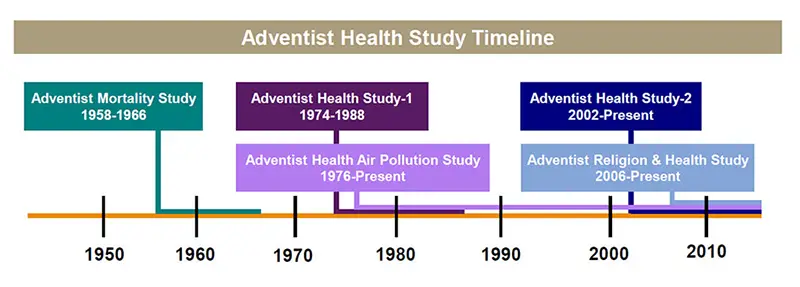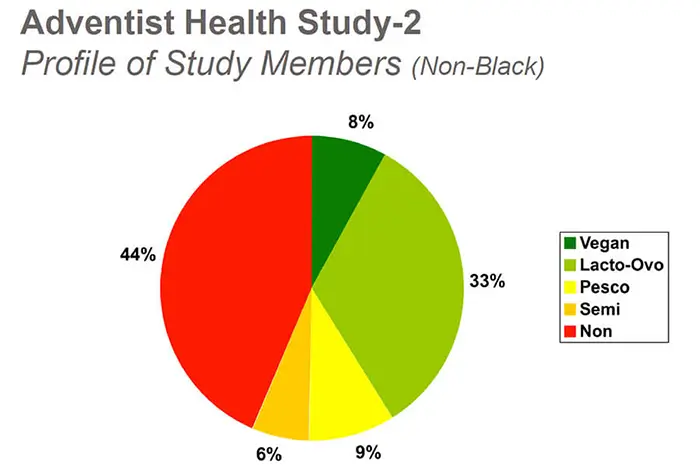Adventist Health Study- The vegan argument
Adventist Health Study showed that Seventh-day Adventists do have a measurable lower risk than other Americans for most of the Western diseases.
Milos Pokimica
Written By: Milos Pokimica
Medically Reviewed by: Dr. Xiùying Wáng, M.D.
Updated June 9, 2023In rural China or other places that are still poor they do not suffer from modern diseases, but also they do not give most of their income on good services of modern medicine. Even in religious groups that have a rigid lifestyle the situation is similar. A good example is a line of studies known as the Adventist Health Study.
Adventist Health Studies (AHS) is a group of long-term studies done by Loma Linda University. They do these studies to see if there is any link between lifestyle and mortality and diseases of Seventh-day Adventists. By a lifestyle they usually mean a plant-based diet with no cigarette smoking because of all lifestyle factors diet is the most influential one to the overall health. In the most recent study that is still being conducted, AHS-2, around 100,000 church members are enrolled from both the US and Canada.
For more than 100 years the Seventh-day Adventist Church had been promoting health behaviors that had become a regular part of daily living. These include not smoking, eating a plant-based diet, regular exercise, and maintaining a healthy body weight. Seventh-day Adventists do have a measurably lower risk than other Americans for most Western diseases. The connection is based on, as is in all other rural parts of undeveloped countries of the world, dietary habits. Also, some part is exercise. Over the past 40 years, two Adventist health studies have been conducted involving 22,940 and 34,000 Californian Adventists.
The first significant study of Adventists started in 1958 and became known as the Adventist Mortality Study. It involved an intensive 5-year follow-up with a more informal 25-year follow-up. By comparing all causes of death Adventist men had a mortality rate of 66% and Adventist women had a rate of 88%. The overall mortality of cancer compared to their counterparts in the American Cancer Society was 60% for Adventist men and 76% for Adventist women. America is 100% baseline, so 60% means 40% lower rates. Lung cancer was 21 percent, meaning 80% lower rates, colorectal cancer deaths were 62 percent. Breast cancer death rates for Adventist women were 85 percent; prostate cancer death rates for Adventist men were 92 percent. Death due to coronary disease among Adventist men was 66%; for Adventist women, it was 98%. The stroke death rates for Adventist men were 72%; for Adventist women 82%. We have to understand that the study was done back in the 60s.
Why is this important? Because they eat a plant-based diet for religious reasons not necessarily for scientific reasons. They eat a diet that is vegan but not necessarily optimized. Sugar is vegan, and so is oil, salt and chips, and a bunch of other junk. Eating a plant-based diet essentially means little if we don’t know precisely why we eat or do not eat something. Vegans who go into this kind of lifestyle for moral reasons may end up in worse health conditions than before they consumed a standard Western meat-dominated diet if they do not know precisely what they are doing. Adventist diet is not fully optimized and actually, they do eat “clean” fish and meat like beef, chicken, or salmon. They do eat eggs. They like “clean” low-fat dairy. What they avoid are “unclean” meats like pork, shellfish, and rabbit, and high-fat dairies like ice cream, sour cream, and butter. They would avoid unclean and toxic substances like alcohol, caffeine, and smoking.
In scientific research, the most inflammatory meat besides processed meats is actually fish followed by chicken. It is not pork or red meat. Probably because of the pollution in fish tanks and fish meal is then also used as feed to the chickens as well. Game meat did prove in research to be someone less inflammatory. In more realistic scenarios on day to day basis, it doesn’t matter how your meat was raised or produced. If it is organic it would have less persistent pollutants accumulated in tissue because animal feed is also sprayed. If you want to feel good and want to have a cow that lived a happy life for psychological reasons then that is some other topic. We have to understand that meat is essentially meat, some worse than others, some terrible but it is not red meat, and process meat is bad, fish good. For example, if you eat regular store beef there would be around 40% more postprandial (post-fed) inflammatory response than for the same amount of kangaroo meat which is one of the “cleanest” meats out there (Arya et al., 2010).
All animal products are pro-inflammatory because there are no antioxidants in them. All of the meat has cholesterol, saturated fat, dead bacteria that will cause endotoxemia, environmental pollutants and toxins, mutagens, and hormones. Also, bacteria that feed on meat in our gut are not probiotic like bacteria that feed on fiber, and that just by itself is pro-inflammatory.
Adventist diet is eaten for religious reasons and not health reasons. They would eat much more calorie-dense foods like vegetables and fruits than the rest of the population, but still, not all vegetables are made equal. This is not a scientifically based and nutritionally optimized diet.
The reason why scientists want to research this type of diet particularly is that in nutrition and health and medicine researchers believe that this type of diet is more realistic as a goal for the average individual. There is a belief that even if the government goes against the corporative interest and was true to advise the most nutrient-dense, antioxidant and phytochemically rich, mineral and vitamin-rich no cholesterol, no fat and no animal products, whole food plant-based diet, a normal phycological response from the average individual would be to ignore it. Just a goal of alcohol, tobacco, and caffeine avoidance is almost completely unrealistic for most of the population. This study was conducted to see what a more realistic approach would have on a large scale population mortality rate. Most people in real life do not have an adequate level of education in the field of nutrition.
Adventists as a group are more educated than the rest of the Californians, and they did have to calculate that into the study as well. The more education we have the greater the chance is that we will go more to healthier food choices independently from any other factor. Leonardo da Vinci, for example, had eaten an ovo-lacto-vegetarian diet just by his conviction in human anatomy. He cut corpses for science.
In the end, mortality rates can be much better, and this study was done back in the 60s. The situation is worse today for the average American with skyrocketing obesity, diabetes, and so on. The current study Adventist Health Study 2 (AHS-2) which began in 2002 also had some sub-studies later. For example, (Orlich et al., 2013) and (Tonstad et al., 2013). They concluded that: “Vegetarian diets are associated with lower all-cause mortality and with some reductions in cause-specific mortality.”
The more plan based we go, the more all-cause and cause-specific mortality drops and not just that. We might live ten years longer or 15, it does not matter. What matter is that we would avoid most of the diseases of affluence which include osteoporosis, type 2 diabetes, cardiovascular disease, obesity, breast cancer, colorectal cancer, and most of the other cancers, acne, gout, depression, and diseases related to vitamin and mineral deficiencies too many to count and all the prescription drugs side effects.
Summary:
Study of Adventist Mortality, 1958-1966 involved 23,000 California Adventists over the age of 25. Conducted at the same time as the American Cancer Society study of non-Adventists. Many causes of death were compared between the two populations. Results:
- Vegetarian Adventists had a significantly lower risk of coronary heart disease (CHD) than non-vegetarian Adventists.
- Consumption of green salads had a significant positive association with all-cause mortality and a significant negative association with egg intake.
- Compared to other Californians, Adventists had lower rates of death for the following cancers: all cancers (60% [of non-Adventist rates] for Adventist men, 75% for Adventist women); lung cancer (21%); colorectal cancer (62%); breast cancer (85%); and CHD (66% for Adventist men, 98% for Adventist women).
Adventist Health Study-1: 1974-1988 involved 34,192 California Adventists over the age of 25. Results:
- Vegetarians had a lower risk of obesity, hypertension, diabetes, and all-cause mortality.
- Beef consumption was significantly related to the risk of fatal heart disease in men.
- Consuming nuts and whole grains on a regular basis was linked to a lower risk of CHD.
- Non-vegetarian Adventists had an 88% higher risk of colon cancer than vegetarian Adventists. Consumption of legumes (beans) reduced the risk of colon cancer.
- Adventist men live 7.3 years longer on average, and Adventist women live 4.4 years longer than the rest of California.
- Men who ate a lot of tomatoes had a 40% lower risk of prostate cancer.
Adventist Health Study-2: 2002-Present, involved 96,000 U.S. and Canadian Adventists over the age of 30. Results:
- Data show a progressive weight gain from a total vegetarian diet to a non-vegetarian diet.
- Vegans, for example, weigh approximately 30 pounds less than non-vegetarians of comparable height.
- Cholesterol, diabetes, high blood pressure, and metabolic syndrome all followed the same pattern: the closer you were to become a vegetarian, the lower your risk in these areas. This is true for both Black and non-Black participants.
- Consuming a lot of cooked green vegetables, brown rice, legumes, and dried fruit has been linked to a lower risk of colon polyps, which is a precursor to colon cancer.
- A vegetarian diet was not linked to lower vitamin D levels. Other factors, such as the amount and intensity of sunlight exposure, had a greater impact on vitamin D levels.
References:
Find out more about Adventist Health Studies and Loma Linda University at adventisthealthstudy.org
- Orlich, M. J., & Fraser, G. E. (2014). Vegetarian diets in the Adventist Health Study 2: a review of initial published findings. The American journal of clinical nutrition, 100 Suppl 1(1), 353S–8S. https://doi.org/10.3945/ajcn.113.071233
- Le, L. T., & Sabaté, J. (2014). Beyond meatless, the health effects of vegan diets: findings from the Adventist cohorts. Nutrients, 6(6), 2131–2147. https://doi.org/10.3390/nu6062131
- Orlich, M. J., Singh, P. N., Sabaté, J., Jaceldo-Siegl, K., Fan, J., Knutsen, S., Beeson, W. L., & Fraser, G. E. (2013). Vegetarian dietary patterns and mortality in Adventist Health Study 2. JAMA internal medicine, 173(13), 1230–1238. https://doi.org/10.1001/jamainternmed.2013.6473
- Tonstad, S., Stewart, K., Oda, K., Batech, M., Herring, R. P., & Fraser, G. E. (2013). Vegetarian diets and incidence of diabetes in the Adventist Health Study-2. Nutrition, metabolism, and cardiovascular diseases : NMCD, 23(4), 292–299. https://doi.org/10.1016/j.numecd.2011.07.004
- Arya, F., Egger, S., Colquhoun, D., Sullivan, D., Pal, S., & Egger, G. (2010). Differences in postprandial inflammatory responses to a ‘modern’ v. traditional meat meal: a preliminary study. The British journal of nutrition, 104(5), 724–728. https://doi.org/10.1017/S0007114510001042
Related Posts
Do you have any questions about nutrition and health?
I would love to hear from you and answer them in my next post. I appreciate your input and opinion and I look forward to hearing from you soon. I also invite you to follow us on Facebook, Instagram, and Pinterest for more diet, nutrition, and health content. You can leave a comment there and connect with other health enthusiasts, share your tips and experiences, and get support and encouragement from our team and community.
I hope that this post was informative and enjoyable for you and that you are prepared to apply the insights you learned. If you found this post helpful, please share it with your friends and family who might also benefit from it. You never know who might need some guidance and support on their health journey.
– You Might Also Like –

Learn About Nutrition
Milos Pokimica is a doctor of natural medicine, clinical nutritionist, medical health and nutrition writer, and nutritional science advisor. Author of the book series Go Vegan? Review of Science, he also operates the natural health website GoVeganWay.com
Medical Disclaimer
GoVeganWay.com brings you reviews of the latest nutrition and health-related research. The information provided represents the personal opinion of the author and is not intended nor implied to be a substitute for professional medical advice, diagnosis, or treatment. The information provided is for informational purposes only and is not intended to serve as a substitute for the consultation, diagnosis, and/or medical treatment of a qualified physician or healthcare provider.NEVER DISREGARD PROFESSIONAL MEDICAL ADVICE OR DELAY SEEKING MEDICAL TREATMENT BECAUSE OF SOMETHING YOU HAVE READ ON OR ACCESSED THROUGH GoVeganWay.com
NEVER APPLY ANY LIFESTYLE CHANGES OR ANY CHANGES AT ALL AS A CONSEQUENCE OF SOMETHING YOU HAVE READ IN GoVeganWay.com BEFORE CONSULTING LICENCED MEDICAL PRACTITIONER.
In the event of a medical emergency, call a doctor or 911 immediately. GoVeganWay.com does not recommend or endorse any specific groups, organizations, tests, physicians, products, procedures, opinions, or other information that may be mentioned inside.
Editor Picks –
Milos Pokimica is a health and nutrition writer and nutritional science advisor. Author of the book series Go Vegan? Review of Science, he also operates the natural health website GoVeganWay.com
Latest Articles –
Top Health News — ScienceDaily
- Scientists discover protein that could heal leaky gut and ease depressionon February 2, 2026
Chronic stress can damage the gut’s protective lining, triggering inflammation that may worsen depression. New research shows that stress lowers levels of a protein called Reelin, which plays a key role in both gut repair and brain health. Remarkably, a single injection restored Reelin levels and produced antidepressant-like effects in preclinical models. The findings hint at a future treatment that targets depression through the gut–brain connection.
- Scientists Warn: This “miracle cure” works only by damaging human cellson February 2, 2026
MMS has long been promoted as a miracle cure, but new research shows it’s essentially a toxic disinfectant. While it can kill bacteria, it only works at levels that also damage human cells and beneficial gut microbes. Scientists warn that homemade MMS mixtures are especially dangerous due to wildly inconsistent dosing. The study calls MMS a clear case where the risks are high—and the benefits are effectively zero.
- A silent brain disease can quadruple dementia riskon February 2, 2026
Researchers studying nearly 2 million older adults found that cerebral amyloid angiopathy sharply raises the risk of developing dementia. Within five years, people with the condition were far more likely to be diagnosed than those without it. The increased risk was present even without a history of stroke. Experts say this makes early screening for memory and thinking changes especially important.
- Alzheimer’s scrambles memories while the brain restson February 1, 2026
When the brain rests, it usually replays recent experiences to strengthen memory. Scientists found that in Alzheimer’s-like mice, this replay still occurs — but the signals are jumbled and poorly coordinated. As a result, memory-supporting brain cells lose their stability, and the animals struggle to remember where they’ve been.
- Middle age is becoming a breaking point in the U.S.on February 1, 2026
Middle age is becoming a tougher chapter for many Americans, especially those born in the 1960s and early 1970s. Compared with earlier generations, they report more loneliness and depression, along with weaker physical strength and declining memory. These troubling trends stand out internationally, as similar declines are largely absent in other wealthy nations, particularly in Nordic Europe, where midlife well-being has improved.
- “Existential risk” – Why scientists are racing to define consciousnesson February 1, 2026
Scientists warn that rapid advances in AI and neurotechnology are outpacing our understanding of consciousness, creating serious ethical risks. New research argues that developing scientific tests for awareness could transform medicine, animal welfare, law, and AI development. But identifying consciousness in machines, brain organoids, or patients could also force society to rethink responsibility, rights, and moral boundaries. The question of what it means to be conscious has never been more […]
- Scientists discover how to turn gut bacteria into anti-aging factorieson February 1, 2026
Researchers found that small doses of an antibiotic can coax gut bacteria into producing a life-extending compound. In worms, this led to longer lifespans, while mice showed healthier cholesterol and insulin changes. Because the drug stays in the gut, it avoids toxic side effects. The study points to a new way of promoting health by targeting microbes rather than the body itself.
PubMed, #vegan-diet –
- Diet type and the oral microbiomeon February 2, 2026
CONCLUSION: The diet-oral microbiome-systemic inflammation axis is bidirectional and clinically relevant. Understanding both direct ecological regulation and indirect metabolic effects is essential to support precision nutrition strategies aimed at maintaining oral microbial balance and systemic inflammatory risk mitigation.
- Consensus document on healthy lifestyleson January 22, 2026
Proteins are a group of macronutrients that are vital to our lives, as they perform various functions, including structural, defensive and catalytic. An intake of 1.0-1.2 g/kg/body weight per day would be sufficient to meet our needs. Carbohydrate requirements constitute 50 % of the total caloric value and should be obtained mainly in the form of complex carbohydrates. In addition, a daily intake of both soluble and insoluble fiber is necessary. Regular consumption of extra virgin olive oil […]
- Vitamin B12 and D status in long-term vegetarians: Impact of diet duration and subtypes in Beijing, Chinaon January 21, 2026
CONCLUSIONS: This study reveals a dual challenge among Beijing long-term vegetarians: vitamin B12 deficiency was strongly associated with the degree of exclusion of animal products from the diet (veganism), while vitamin D deficiency was highly prevalent and worsened with longer diet duration. The near-universal vitamin D deficiency observed in this study suggests that, in the Beijing context, the risk may extend beyond dietary choice, potentially reflecting regional environmental factors;…
- Nutritional evaluation of duty meals provided to riot police forces in Germanyon January 13, 2026
Background: The primary role of the German riot police is maintaining internal security. Due to challenging working conditions, riot police forces face an elevated risk of various diseases. During duty, forces are provided with meals. A balanced diet can reduce the risk of some of these diseases and contribute to health-promoting working conditions. Aim: First evaluation of the nutritional quality of duty meals in Germany based on German Nutrition Society recommendations (DGE). Methods: In…
- Iodineon January 1, 2006
Iodine is an essential trace nutrient for all infants that is a normal component of breastmilk. Infant requirements are estimated to be 15 mcg/kg daily in full-term infants and 30 mcg/kg daily in preterm infants.[1] Breastmilk iodine concentration correlates well with maternal urinary iodine concentration and may be a useful index of iodine sufficiency in infants under 2 years of age, but there is no clear agreement on a value that indicates iodine sufficiency, and may not correlate with […]
Random Posts –
Featured Posts –
Latest from PubMed, #plant-based diet –
- Effect of the gut microbiota on insect reproduction: mechanisms and biotechnological prospectsby Dilawar Abbas on February 2, 2026
The insect gut microbiota functions as a multifunctional symbiotic system that plays a central role in host reproduction. Through the production of bioactive metabolites, gut microbes interact with host hormonal pathways, immune signaling, and molecular regulatory networks, thereby shaping reproductive physiology and fitness. This review summarizes recent advances in understanding how gut microbiota regulate insect reproduction. Accumulating evidence demonstrates that microbial metabolites…
- Rationale and design of a parallel randomised trial of a plant-based intensive lifestyle intervention for diabetes remission: The REmission of diabetes using a PlAnt-based weight loss InteRvention…by Brighid McKay on February 2, 2026
CONCLUSIONS: This trial will provide high-quality clinical evidence on the use of plant-based ILIs to address the epidemics of obesity and diabetes to inform public health policies and programs in Canada and beyond.
- Diet type and the oral microbiomeby Daniel Betancur on February 2, 2026
CONCLUSION: The diet-oral microbiome-systemic inflammation axis is bidirectional and clinically relevant. Understanding both direct ecological regulation and indirect metabolic effects is essential to support precision nutrition strategies aimed at maintaining oral microbial balance and systemic inflammatory risk mitigation.
- The Potential of Plant-Based Lifestyle Interventions to Reduce the Burden of Disease in a Multi-Crisis Eraby Komathi Kolandai on February 2, 2026
This transdisciplinary, evidence-based viewpoint draws attention to literature suggesting that formalized plant-based lifestyle interventions have the potential to reduce the risk of COVID-19 and non-communicable diseases. Such interventions also offer the health sector a way to contribute to mitigating the risk of new zoonotic diseases and reducing carbon emissions (and, consequently, climate-change-induced diseases), all of which would help lower the overall disease burden. However, several…
- Association between Mediterranean Diet and Development of Multiple Sclerosis: A Systematic Review and Meta-Analysisby Fatemeh Shakouri on January 30, 2026
BACKGROUND: Multiple sclerosis (MS) is a chronic inflammatory demyelinating disease of the central nervous system. Given the conflicting evidence regarding the impact of adherence to the Mediterranean diet (MedDiet) on MS development and the lack of a systematic review on this topic, this study aimed to examine this association.
- Mediterranean diet adherence and tirzepatide: real-world evidence on adiposity indices and insulin resistance beyond weight lossby Valentina Paternò on January 30, 2026
CONCLUSION: This real-world study confirms the efficacy of tirzepatide on adiposity and metabolic markers and provides exploratory evidence that adherence to a Mediterranean diet enhances its impact on visceral adiposity. The combination of pharmacological therapy and diet quality may offer additive benefits, and the integration of both PREDIMED and VAI in future studies could support more comprehensive strategies for cardiometabolic risk stratification and obesity care.




















